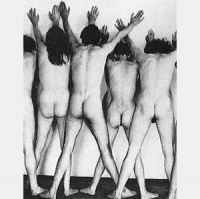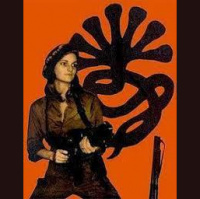Synopsis
MAKE_WORLD is a podcast exploring attempts to live differently: to create new political, social and cultural realities - from utopias to cults to revolutions and communes. If youve ever wondered if there's another way to live, or are just curious about the crazy experiments others have tried, this is the show for you.
Episodes
-
5: Making Change Happen, with Roger Hallam (Pt. 1)
27/02/2020 Duration: 20minThis is the first part of a multi-part interview with Roger Hallam, co-founder of Extinction Rebellion, an environmental movement which is using nonviolent civil disobedience to force government action around the climate crisis. This episode marked kind of a watershed for the Make World project, in that it galvanised both some of my own personal thinking around system change, and suggested what could be a new way forward for the project -- more on that soon. This episode was recorded with Roger in person, at his farm in South Wales, UK. We discuss: the need for radical change, and what history can teach us about how and under what circumstances change happens; how Roger sees XR's programme as part of a moral imperative, one he argues is 'beyond' politics; and we dig a little bit into the detail of the 'Citizens' Assembly' XR proposes to deliberate on the massive challenges facing us as a society -- how Citzen's Assemblies would work in practice, and some recent examples suggestive of their efficacy.
-
4: Microsolidarity: How A Cult-Lite Structure Could Lead To Happiness, with Rich Bartlett
10/09/2019 Duration: 53minThis episode is a loose exploration of Rich's personal and political background, as inputs to the key themes of the Microsolidarity proposal. We discuss his early life in a fundamentalist Christian church in New Zealand, and how leaving this cultish environment actually proved an important lesson in how to move beyond limited or unproductive belief systems. One of the key factors in Rich being able to get out of that church was an early bout of what he terms 'performative agnosticism' -- a deliberate engagement with ideas that may run contrary to one's own. Imagining a world in which God did not exist put Rich on a whole new track, one which determines his path to this day. What could we be gained by taking a similarly open mind towards others' ideas, whether to integrate or jettison them down the road? Could this be healthier than the left's puritanical, so-called 'cancel culture', obsessed with negating anything it dislikes or disagrees with? And what is it that makes some people able to audition 'dangerou
-
3: This World Is Not My Home: Kommune 1 & The Psychology Of Change
09/07/2019 Duration: 29minThis episode returns to the interview with Kommune 1's Rainer Langhans for a close-up look at the critical role of personal psychology in producing lasting social change. From Adam Curtis' idea of over-administration of psychiatric drugs since the 1990s as a strategic means of producing normality, to Herbert Marcuse's earlier revelation that psychological and psychiatric techniques could become weapons to create revolutionary states of mind, this episode examines a shift that started to take place in the 1960s: -- towards the idea that change could be pursued from the inside out - first through radical interpersonal practices seen in Kommune 1 and later by meditation, trance and psychedelic drugs. What can Rainer Langhans' comments on his early autism tell us about the relationship between 'non-neurotypical' thinking -- and radical politics. And could we see Kommune 1 as an early attempt to manufacture an 'anti-neurotypical' individual, one with new needs and desires, so radical as to power a revolution?
-
2: Stockholm Syndrome
11/04/2019 Duration: 12minThis episode considers the phenomenon of Stockholm Syndrome. Why do some people change suddenly and against character during intense conflict situations? What happened to the heiress Patty Hearst after she was captured by the Symbionese Liberation Army, and what can this teach us about how enact rapid social change? It's a good question to ask right now. If the world doesn't turn on a dime, away from the present norms of hyper-consumption, and towards something unprecedentedly new, then, simply put, change will be forced upon us, in the form of catastrophic environmental decline, including mass extinction of the biomes which sustain us. In fact his this change is already happening, we're already living its early stages, and the time to alter our behaviour is yesterday. Time to get Stockholmed!
-
1: Kommune 1, with Rainer Langhans (Part One)
28/02/2019 Duration: 32min** Support us on Patreon and join the Make World community: https://patreon.com/makeworld ** This is the first part of a multi-part series looking at Kommune 1 (https://en.wikipedia.org/wiki/Kommune_1) , the original radical German commune of the 1960s. The series is based around interviews with K1 communard Rainer Langhans (https://de.wikipedia.org/wiki/Rainer_Langhans) . In this episode we discover Rainer's childhood under Nazism, and how that fed into the desire to establish a new mode of anti-authoritarian living in Kommune 1. We look in detail at the commuards' intense self-investigation and interpersonal 'mirrroring', and why this led some to dub them 'The Horror Commune'. How were these techniques rooted in the the theories of Wilhelm Reich (https://en.wikipedia.org/wiki/Wilhelm_Reich) , Herbert Marcuse (https://en.wikipedia.org/wiki/Herbert_Marcuse) and the antipsychiatrist RD Laing? Finally we move on to the key actions which propelled Kommune 1 to fame: the so-called 'Pudding Assassination (https:/








